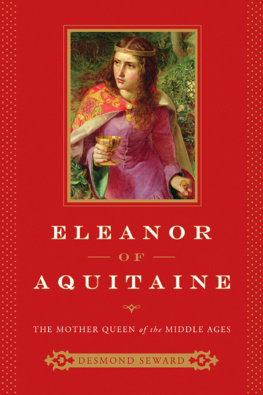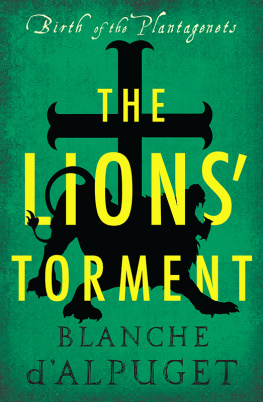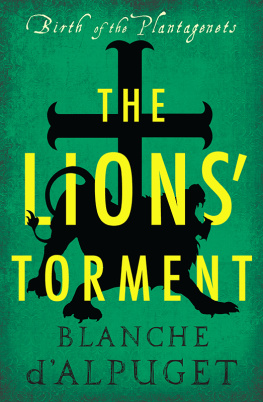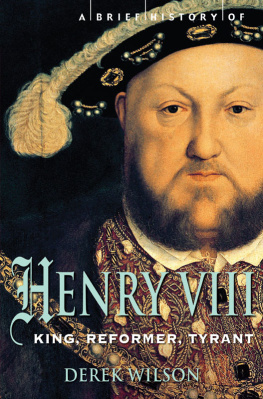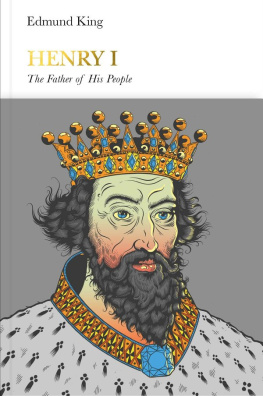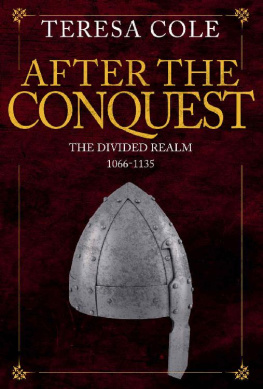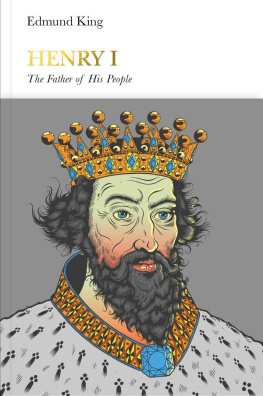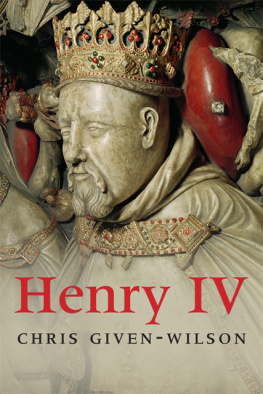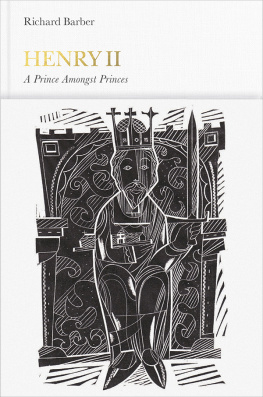
Copyright 2016 Matthew Strickland
All rights reserved. This book may not be reproduced in whole or in part, in any form (beyond that copying permitted by Sections 107 and 108 of the U.S. Copyright Law and except by reviewers for the public press) without written permission from the publishers.
For information about this and other Yale University Press publications, please contact:
U.S. Office:
Europe Office:
Typeset in Adobe Caslon Pro by IDSUK (DataConnection) Ltd
Printed in Great Britain by Gomer Press Ltd, Llandysul, Ceredigion, Wales
Library of Congress Cataloging-in-Publication Data
Names: Strickland, Matthew, 1962- author.
Title: Henry the Young King, 1155-1183 / Matthew Strickland.
Description: New Haven : Yale University Press, 2016.
LCCN 2016009450 | ISBN 9780300215519 (cl : alk. paper)
LCSH: Henry, King of England, 1155-1183. | Great BritainKings and rulersBiography. | Henry II, King of England, 11331189Family. | Great BritainHistoryHenry II, 1154-1189.
Classification: LCC DA206 .S77 2016 | DDC 942.03/1092dc23
LC record available at http://lccn.loc.gov/2016009450
A catalogue record for this book is available from the British Library.
10987654321
For Debra
Contents
Illustrations
Maps
Preface
A KING WITHOUT A realm is at a loss for something to do: at such a loss was the noble and gracious Young King. Thus the poet Jordan Fantosme, writing for the Plantagenet court soon after the great war of 117374 which had pitted Henry II against his own son, Henry the Young King, encapsulated the paradox that lies at the heart of this study. Young Henry was the first and last king of England since the Norman Conquest to be crowned in the lifetime of his father. The desire to have his son created as an anointed king had been a driving factor in Henry IIs policies from at least 1162, and in 1170 he had pushed through his sons coronation by the archbishop of York in highly contentious circumstances, which would lead, unwittingly but directly, to the murder of Thomas Becket only six months later. Yet despite the enormous significance he had attached to his sons regal status, Henry II never felt able to grant his eldest son direct rule of any of the Angevin lands. The resulting tension between young Henrys royal rank and his lack of effective power was, as Jordan Fantosme recognized, the root cause of his rebellion in 1173, which shook the Angevin empire to its core. This book is a study of the life of young Henry, not only principal heir to Henry II and titular co-ruler of the heartlands of the great Plantagenet dominions, but also one of the most charismatic and celebrated chivalric figures of later twelfth-century Europe. It is also the story of an experiment in associative kingship that failed catastrophically, and of a king without a kingdom.
The book adopts a chronological framework, but the examination of the nature of Angevin kingship, of associated rulership, of warfare and of rebellion runs as binding thread throughout. It falls naturally into three parts. The first examines young Henrys early life, from the extraordinary circumstances of his marriage, when aged only five to the still younger Margaret, daughter of Louis VII, through his brief but influential period in the household of Thomas Becket, to his coronation in 1170 and regency of England until 1172, a regency plunged into crisis by the return of Archbishop Thomas from exile, then fatefully overshadowed by Beckets murder and its consequences. The second part comprises an analysis of the causes, course and consequences of the great war of 117374, which came close to unseating his father, the Old King, and profoundly affected subsequent relations between father and son, particularly in the years between 1175 and 1177, when fears of renewed war were never distant. The third traces the period of comparative stability from 1178 to 1182, marked by young Henrys prominent participation in the tournament circuit and his significant role in the military and diplomatic efforts of the Angevins to keep the balance of power in northern France. It then turns to the collapse of this entente in the bitter war of 1183 which resulted from young Henrys attempt to wrest Aquitaine from his brother Richard, but which again plunged much of the Angevin empire into turmoil, and only ended with the Young Kings premature death from disease on campaign. It concludes with an examination of his death, commemoration and legacy.
In the preface to his own chronicle, the Winchester monk and historian Richard of Devizes explained to his friend Robert, the works recipient, that he would commence his account a little earlier than they had agreed, and begin from the accession of Richard I in 1189. And because I could not hope to unravel the whole story, he noted, I have undertaken only the latter part of it. Why, and how, and when the father crowned his son; how much and what manner of things they accomplished; whose lands they invaded and when and to what extent; and to what end each came; all this I have left to those who want to bring forth bigger things. I should no doubt have done likewise. Richards wisdom in declining to embark on the dauntingly large subject of Henry II and his family became increasingly clear as this work progressed, and Devizes himself would surely have appreciated Manuel Rojas jest that it was taking so long to write the book that the Young King was becoming the Old King.
Nevertheless, one of the great dividends of undertaking this study of the young Henry has been the pleasure of engaging with a large number of scholars who have generously shared their very diverse expertise in and beyond lespace Plantagent. I have been greatly helped by a number of friends and colleagues, and here I would like to thank Adrian Ailes, Bill Aird, Stuart Airlie, Richard Allen, Martin Aurell, David Bates, Rob Bartlett, Matthew Bennett, Mat Billor, Colette Bowie, Dauvit Broun, David Carpenter, Jo Cerda, Stephen Church, Michael Clanchy, Laura Cleaver, David Crouch, Archie Duncan, Katy Dutton, Peter Edbury, John France, Daniel Gerrard, John Gillingham, Judith Green, Sandy Heslop, John Hudson, Jitske Jasperse, Edmund King, Henry Mayr-Harting, Ralph Moffat, Alheydis Plassmann, Daniel Power, Manuel Rojas, David Sherlock, Ian Short, Jim Simpson, Roger Smith, Michael Staunton, Keith Stringer, Liesbeth van Houts, Colin Veach, Nicholas Vincent, Bjorn Weiler and Bill Zajac.
Deserving of special thanks are Stephen Church and the anonymous reader for Yale University Press (who betrayed a particularly in-depth knowledge of the Pipe Rolls and of equine matters), as well as Stephen Marritt, Andrew Roach and Manuel Rojas, all of whom read through early drafts of the book, saved me from numerous errors and made many helpful comments. John Gillingham likewise kindly read a later draft, and the resulting book is much the stronger for his valuable input. It has equally benefited very considerably from Dan Powers expertise on Normandy and its aristocracy, while I am also grateful to Michael Staunton for advice both on Thomas Becket and on historical writing in the later twelfth century. Nicholas Vincent helpfully provided me with a copy of the as yet unpublished Angevin Acta, and both he and David Crouch have been generous with references and in sharing unpublished research and materials. Judith Everard kindly sent me her Itinerary of Henry II ahead of its publication in the Angevin Acta.
My thanks are due to Heather McCallum, Melissa Bond and Rachael Lonsdale at Yale University Press for steering the book through to completion with patience and good-natured forbearance, and to Beth Humphries whose careful copy-editing has saved me from numerous stylistic infelicities.
Next page


